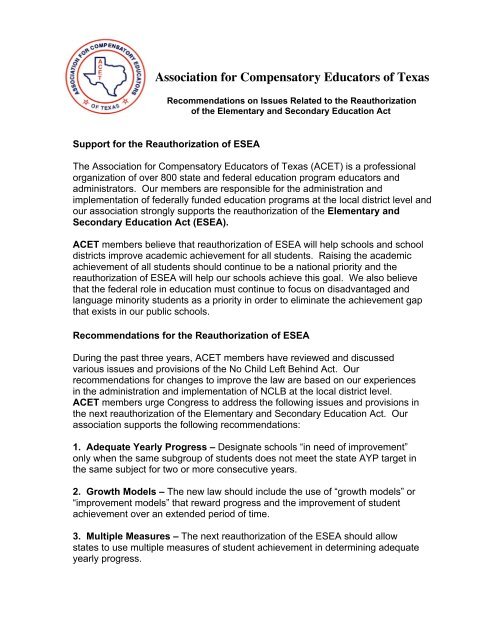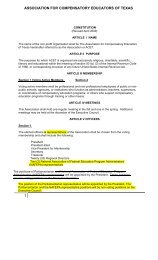Association for Compensatory Educators of Texas - ACET
Association for Compensatory Educators of Texas - ACET
Association for Compensatory Educators of Texas - ACET
You also want an ePaper? Increase the reach of your titles
YUMPU automatically turns print PDFs into web optimized ePapers that Google loves.
<strong>Association</strong> <strong>for</strong> <strong>Compensatory</strong> <strong>Educators</strong> <strong>of</strong> <strong>Texas</strong>Recommendations on Issues Related to the Reauthorization<strong>of</strong> the Elementary and Secondary Education ActSupport <strong>for</strong> the Reauthorization <strong>of</strong> ESEAThe <strong>Association</strong> <strong>for</strong> <strong>Compensatory</strong> <strong>Educators</strong> <strong>of</strong> <strong>Texas</strong> (<strong>ACET</strong>) is a pr<strong>of</strong>essionalorganization <strong>of</strong> over 800 state and federal education program educators andadministrators. Our members are responsible <strong>for</strong> the administration andimplementation <strong>of</strong> federally funded education programs at the local district level andour association strongly supports the reauthorization <strong>of</strong> the Elementary andSecondary Education Act (ESEA).<strong>ACET</strong> members believe that reauthorization <strong>of</strong> ESEA will help schools and schooldistricts improve academic achievement <strong>for</strong> all students. Raising the academicachievement <strong>of</strong> all students should continue to be a national priority and thereauthorization <strong>of</strong> ESEA will help our schools achieve this goal. We also believethat the federal role in education must continue to focus on disadvantaged andlanguage minority students as a priority in order to eliminate the achievement gapthat exists in our public schools.Recommendations <strong>for</strong> the Reauthorization <strong>of</strong> ESEADuring the past three years, <strong>ACET</strong> members have reviewed and discussedvarious issues and provisions <strong>of</strong> the No Child Left Behind Act. Ourrecommendations <strong>for</strong> changes to improve the law are based on our experiencesin the administration and implementation <strong>of</strong> NCLB at the local district level.<strong>ACET</strong> members urge Congress to address the following issues and provisions inthe next reauthorization <strong>of</strong> the Elementary and Secondary Education Act. Ourassociation supports the following recommendations:1. Adequate Yearly Progress – Designate schools “in need <strong>of</strong> improvement”only when the same subgroup <strong>of</strong> students does not meet the state AYP target inthe same subject <strong>for</strong> two or more consecutive years.2. Growth Models – The new law should include the use <strong>of</strong> “growth models” or“improvement models” that reward progress and the improvement <strong>of</strong> studentachievement over an extended period <strong>of</strong> time.3. Multiple Measures – The next reauthorization <strong>of</strong> the ESEA should allowstates to use multiple measures <strong>of</strong> student achievement in determining adequateyearly progress.
4. Schoolwide Programs – Continue the provisions in the law that allow eligibleTitle I schools to implement schoolwide programs using various federal fundingsources.5. English Language Learners (ELL) – Include a provision that allows statesand school districts to use portfolios and other alternate, valid and reliableassessment measures to assess English language pr<strong>of</strong>iciency and a provisionthat allows states to exclude the assessment results <strong>of</strong> recently arrived ELLswhen determining adequate yearly progress.6. Supplemental Educational Services – Establish strong accountabilityrequirements <strong>for</strong> the providers <strong>of</strong> supplemental educational services as aprovision in the new law. Providers <strong>of</strong> supplemental educational services shouldbe held to the same high accountability standards as the public schools theyserve.7. Highly Qualified Teachers – Provide flexibility in the requirements anddefinition <strong>of</strong> a highly qualified teacher to address the circumstances <strong>of</strong> secondaryschool math and science teachers, teachers in special education and bilingualeducation programs, and teachers in small schools and rural areas who teachmultiple subjects.8. Funding – A substantial increase in the funding authorization <strong>for</strong> Title I andother ESEA programs must be a priority in the next reauthorization. Adequatefunding is necessary to provide all <strong>of</strong> the mandated services and to implementeffective schoolwide programs in all eligible Title I schools.



